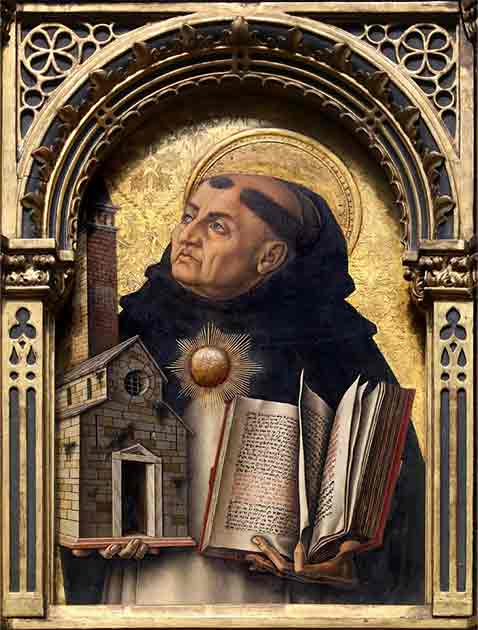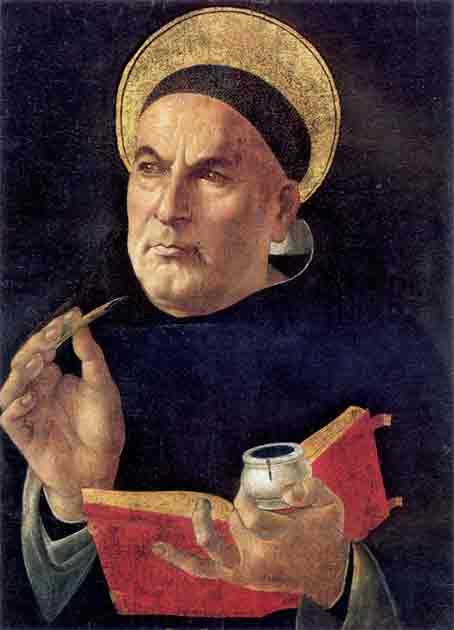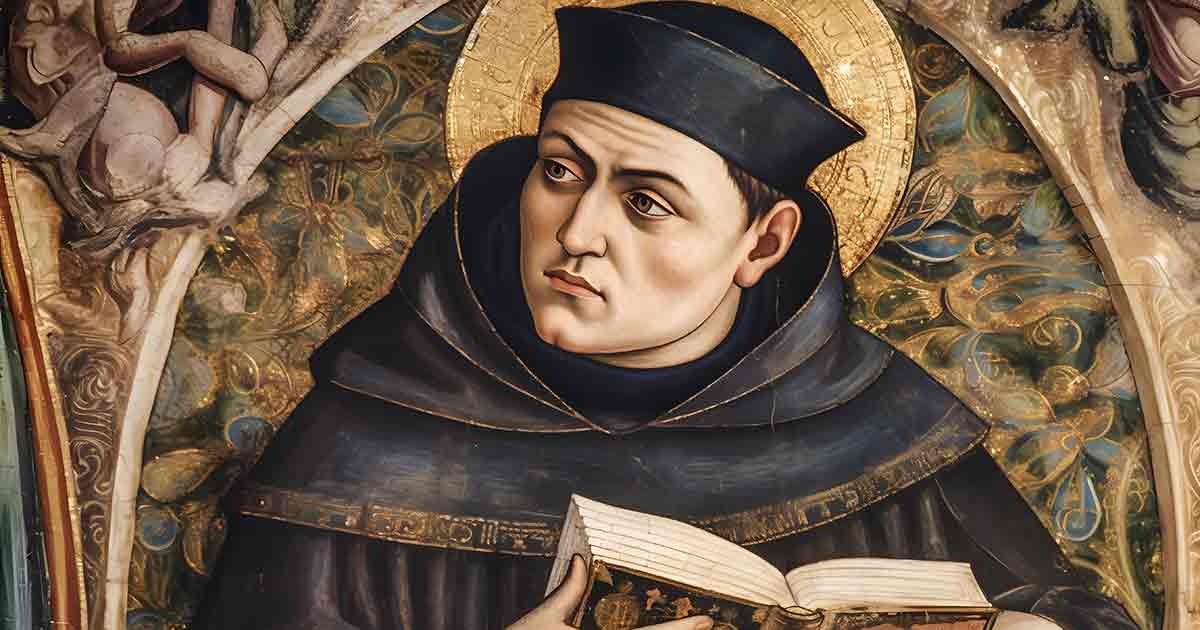Who Was Thomas Aquinas and Why Is He Mentioned So Often?
Thomas Aquinas, who lived from 1225 to 1274 AD, played a crucial role in medieval Catholic theology and philosophy. Thanks to his profound insights and masterful integration of faith and reason, Thomas Aquinas left an enduring imprint on the intellectual fabric of Western thought.
Born into a noble family in Italy, Aquinas would go on to become a Dominican friar, a prolific writer and a key architect of Scholasticism, a major medieval school of philosophy. Aquinas wrote extensively on a wide range of topics, including metaphysics, ethics, natural theology and political theory. His work, particularly the monumental Summa Theologica, aimed at harmonizing faith and reason, has had a lasting impact on theology, philosophy and education.

The Triumph of Saint Thomas Aquinas over Averroes by Benozzo Gozzoli, which depicts Saint Thomas Aquinas between Aristotle and Plato with the philosopher Averroes on the ground. (Public domain)
Thomas Aquinas as the Key Figure of Scholasticism
Thomas Aquinas was born in Roccasecca Castle in the Kingdom of Sicily (modern Italy). Despite family opposition, he entered the Dominican Order at the age of 17, embracing a life dedicated to study and service to religion. His decision to join the Dominicans, a religious order known for its emphasis on intellectual pursuits, set the stage for Aquinas's future contributions to theology and philosophy.
His education, thanks to his noble birth, was marked by exposure to the works of Aristotle, a philosopher whose ideas had been largely neglected in Western Europe at the time. This encounter sparked a lifelong interest in reconciling Aristotelian philosophy with Christian theology, setting him on a path of intellectual exploration. Thus, Thomas Aquinas transcended the role of an ordinary Dominican friar, and went on to become a philosopher who sought to combine religious belief with major philosophical thought.
- Elusive Epicurus, Hellenistic Greek Philosopher In Search Of Happiness
- Medieval Maverick: Roger Bacon's Quest for Knowledge and Truth
Aquinas's most significant contribution lies in his attempt to synthesize faith and reason. In an era where faith and reason were often seen as conflicting, he argued that they could coexist harmoniously. Drawing on Aristotle's philosophy, Aquinas posited that reason, guided by revelation, could lead to a deeper understanding of theological truths.
This synthesis became a cornerstone of Scholastic thought, influencing subsequent philosophical and theological developments. In time, Thomas Aquinas became a key figure in the Scholastic tradition, which dominated medieval philosophy and education at the time. Scholasticism emphasized the use of reason in the exploration of theology and philosophy, and Aquinas's work exemplified this approach.

Saint Thomas Aquinas by Carlo Crivelli circa 1476. (Carlo Crivelli / CC BY 3.0)
A Man Destined to Greatness: Thomas Aquinas’ Summa Theologica
At the heart of Thomas Aquinas's intellectual legacy is the Summa Theologica, a comprehensive work that addressed a wide range of theological and philosophical questions. Structured as a series of articles and questions, Summa Theologica covers topics such as the existence of God, ethics, the nature of humanity and the sacraments.
This magnum opus reflects Aquinas's systematic approach to theology and his commitment to rigorous inquiry. His exploration of natural theology, the study of God through reason and observation of the natural world, is a notable aspect of his work.
In his Five Ways, Aquinas presented arguments for the existence of God based on observation of motion, causation, contingency, perfection and order in the universe. These arguments have been subjects of scrutiny and debate for centuries.
Aquinas's influence on Scholasticism, a medieval intellectual movement that sought to reconcile classical philosophy with Christian theology, cannot be overstated. His methods of inquiry and synthesis provided a framework for subsequent Scholastic thinkers, shaping the educational landscape of medieval universities.
Thomas Aquinas's impact thus extends beyond the medieval period. His ideas continue to shape Catholic theology, and his works are studied in philosophy and theology courses worldwide to this day. Canonized as a saint in 1323 AD, he earned the titles Doctor Angelicus (Angelic Doctor) and Universal Doctor of the Church, attesting to his significance in Catholic intellectual tradition.
During the Middle Ages, however, his works were the cornerstone of theological and universal education. Aquinas's methods and ideas have played a significant role in shaping the curriculum and approach to education in Western universities during this period when education was in many ways rudimentary.
- Aristotle is Dead, but his Ideas are Alive: On Private Property and Moneymaking – Part I
- Saint Augustine of Hippo and His Detours on the Long and Winding Path to Christianity
His works were widely studied in medieval universities, and they influenced and inspired many other important religious thinkers in the following centuries. Within the Catholic Church itself, Thomas Aquinas remains a foremost thinker, as his doctrines and thoughts helped refine Catholicism and introduce new aspects into it.

Thomas Aquinas as imagined by Sandro Botticelli. (Public domain)
A Name Etched in Religious History
In the overall Western intellectual history, the life and works of Thomas Aquinas stand as a bridge between faith and reason, which were often at odds. He was considered a luminary whose ideas have endured through the centuries thanks to their importance and refinement.
His synthesis of Aristotelian philosophy with Christian theology—two seemingly disconnected schools of thought—has left an indelible mark on the realms of theology, philosophy and education. As we continue to grapple with the interplay between faith and reason, Aquinas's legacy remains a guiding light, inviting scholars and seekers alike to engage in the pursuit of wisdom and understanding.
Top image: Representational image of Saint Thomas Aquinas. Source: ckybe / Adobe Stock
References
Davies, B. 1992. The Thought of Thomas Aquinas. Clarendon Press.
Davies, B. 2014. Thomas Aquinas's Summa Theologiae: A Guide and Commentary. Oxford University Press.
St. Thomas Aquinas's Works in English. Available at: https://isidore.co/aquinas/index.html
Torrell, J.P. 2005. Saint Thomas Aquinas: The person and his work, Volume 1. CUA Press.


















Comments
When an anti-heritical saint is himself influenced heavily by Pagan philosophy, a Latin saying could come to mind.
Namely, "Quis custodiet ipsos custodes?"
The Inquisition was underway when Aquinas joined the Dominican order. The order that Aquinas devoted his life to was devoted to and quite probably initiated for the very purpose of rooting out opposition to corruption within the Catholic Church
Aquinas himself wrote, "As for heretics, their sin deserves banishment, not only from the Church by excommunication, but also from this world by death."
The Inquisition was underway when Aquinas joined the Dominican order. The order that Aquinas devoted his life to was devoted to and quite probably initiated for the very purpose of rooting out opposition to corruption within the Catholic Church
Aquinas himself wrote, "As for heretics, their sin deserves banishment, not only from the Church by excommunication, but also from this world by death."
The Inquisition was underway when Aquinas joined the Dominican order. The order that Aquinas devoted his life to was devoted to and quite probably initiated for the very purpose of rooting out opposition to corruption within the Catholic Church
Aquinas himself wrote, "As for heretics, their sin deserves banishment, not only from the Church by excommunication, but also from this world by death."